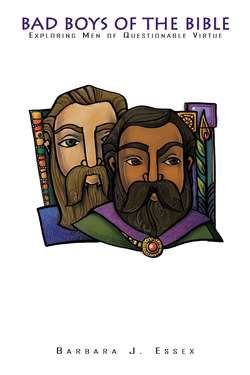Читать книгу Bad Boys of the Bible: - Barbara J. Essex - Страница 9
На сайте Литреса книга снята с продажи.
INTRODUCTION
Оглавление“You’re writing a book about the bad boys of the Bible? Are there any other kind?” The questions were often asked in jest, but they contain an element of truth. Many of the men in the Bible have both heroic and sordid qualities. They are called and anointed by God to do great things. They accomplish much and present themselves as pioneers and able servants of God. They proclaim powerful insights about the relationship between God and God’s people. They perform magnificent acts of valor and courage. They symbolize the tenderness and nurture inherent in a close, intimate relationship with God. They exercise justice and are able to present a bigger picture than the human mind can grasp. But they also commit outrageous acts. They lie, cheat, and steal. They kill and maim. They are cunning and underhanded. They are arrogant, uncontrollable, and weak. They whine and complain. They betray and deceive. They rape and plunder. Their stories are a mixture of curiosity, shame, anger, sadness, and triumph. Their stories are those of human beings who are strong and weak, faithful and challenged. This book will explore their contexts of leadership and their challenges of character as they attempt to work on behalf of God and God’s people.
The stories of these selected “bad boys” are strange accounts of good and bad, obedience and failure. For instance, when Moses, the great deliverer and liberator, receives his call from God, he is a fugitive murderer hiding out from the Egyptian court that saved his life and raised him. Jephthah, a warrior for Israel in the days before monarchs ruled the nation, wages a successful military campaign against the dreaded Philistines. Yet he makes a foolish, irrevocable vow and murders his daughter, his only child. Jonah is a prophet of great preaching ability; on the strength of one sermon, Jonah saves the entire city of Nineveh. However, he tries unsuccessfully to escape his call and is swallowed by a fish. When he is successful in bringing Nineveh to repentance and salvation, Jonah pouts and is angry because the city is saved. Even David, the greatest king in the history of Israel, has a sordid story of adultery, murder, and thuggery. The evil deeds of his children haunt him his whole life and cause him great pain, distress, and anxiety.
The perspective of patriarchy, which undergirds the biblical witness, has given these men a high place in salvation history. Thus, we often focus solely on their positive qualities as if they were perfect human beings. We tout them as role models and ignore the all too human aspects of their character and behavior. Too often, in our preaching and teaching, their flaws and sins are overlooked, excused, or downplayed. Their outrageous acts are seen as means to ends that support God’s purpose and intentions. But a closer look reveals very human and, sometimes, very base instincts and character flaws in these men. In Bad Boys of the Bible I hope to lay open for scrutiny their character and context as well as explore the lessons we can learn from them. Their stories have implications for how we behave and how we exercise leadership both in the church and in the society at large. We will examine the issues of power and leadership as they are raised in the stories of these biblical men.
This volume is a continuation of a previous work, Bad Girls of the Bible: Exploring Women of Questionable Virtue, in that it seeks to present a more informed, critical picture of biblical characters. Thus we will be drawing on scholarship from feminist, womanist, and other critical methods of reading and interpreting biblical texts. It is assumed that you have little or no prior knowledge of the technical aspects of biblical exegesis. The next chapter serves as an overview of biblical methods of interpretation that will help you understand the background and context of the stories we will study. Some of the units will present us with challenges: we might be reluctant to analyze closely these giants for fear that we will offend God. We might be confronted with information that seems blasphemous and will want to reject the lessons available to us. We might simply refuse to believe what is written—but I encourage you to hang in with the process! This kind of critical study should not undermine our faith; instead, it should deepen, broaden, and expand it as we learn more about who these characters are and what motivates them. The miracle of the Bible is that it presents us with pictures of real people who are not one-dimensional. We see the good, the bad, and the ugly; the Bible does not try to present perfect people. We are given the opportunity to see ourselves reflected in the stories of the persons we hold up as models of faith and service. And we are reminded of God’s grace and mercy that is available to all of us—in spite of questionable decisions and actions. We are gifted with a whole picture of humanity and God’s undying love for us.
Each study unit will review the stories of a selected biblical man. A short commentary follows, which will provide background information to help make the story accessible and understandable for modern readers. Each unit will end with a set of reflection questions. I hope this study will help us to examine ourselves—our own motives, assumptions, and identity—so that our faith is deepened and our deeds of service are based on a sound understanding of who we are as Christians and servants of God.
This resource is intended to be informative, user-friendly, challenging, inspirational, and fun!
